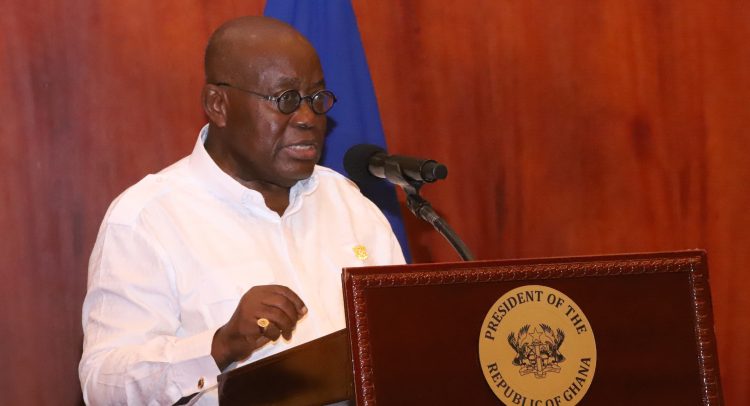President Nana Akufo-Addo
President Nana Akufo-Addo, has said the country is beginning to see the positive impact of investments in the health sector.
Addressing the 2021 Health Performance Review and Summit themed, ‘Strengthening the Resilience of Ghana’s Health System to Better Respond to Emergencies’, the President said, “It is significant to note that as a country, we have made steady progress in improving the health and well-being of our people.”
He opined that efforts at bridging the equality gap in access to quality health care continue to show some improvement adding that significant progress has been recorded in maternal and neo natal mortality reduction.
“Life expectancy has improved from 57 years in 1990 to 64 years in 2017,” he said.
President Akufo-Addo, however, noted that despite the progress made, the country is faced with a complex burden of communicable and non-communicable diseases, maternal and neo-natal health conditions, and accidents affecting different ages, gender, and socio-economic status groups.
“Projections have it that we may not achieve the SDG/UHC targets with the current health service delivery system and funding architecture. We also have the Triple Transition Phenomena (epidemiological, demographic and socio-economic) providing an ever-changing context to contend with,” he stated.
President Akufo-Addo accordingly called for a collective rethink of innovative leapfrog strategies for national action urging health stakeholders to discuss and agree on a robust system and approach that protects citizens at all times from outbreaks of infectious diseases.
“We must discuss how to collectively and multi-sectorally deal with systemic issues in Pre-hospital and public health emergency services, how to deal with sustainable financing of health within the context of Ghana Beyond Aid, ensure continuity of essential health service delivery in the face of infectious disease attacks and take practical steps to reduce inequities in service delivery in these areas (Mental health, Geriatric Services and Palliative Care among others),” he urged.
Minister of health, Kwaku Agyeman-Manu described the sector’s performance for 2020 as mixed stating that some indicators were met while a number of milestones suffered due to inadequate financing of programmes and the impact of Covid-19 pandemic.
“The President launched the National Health Policy, the Universal Health Coverage road map for Ghana, Healthcare Waste Management Policy and begun the development of the hospital infrastructure strategy to guide health infrastructure planning,” he stated.
Mr. Agyeman-Manu said with the NHIS’s mobile renewal service, membership increased from 12.29m in 2019 to 13.96m in 2020 of which 80 per cent of the renewals were by mobile means.
“The authority also piloted family planning in selected districts for possible inclusion in the NHIS benefits package and included Herceptin to the benefit package for the treatment of breast cancer,” he added.
The sector minister further noted that approval has been given for construction works to begin on major health projects including the Koforidua Regional Hospital, Shama District Hospital, La General Hospital, Tema General Hospital and the Tema Medical Stores.
“Nkoransa District Hospital, Dormaa Accident & Emergency center, 400 bed Obstetrics and Gynaecology block at the Korle-Bu Teaching hospital, Urology and Nephrology center at Korle Bu Teaching Hospital, 11 40-bed and one 30-bed hospitals in Ashanti, Bono, Greater Accra and Eastern regions and Trauma hospital at Obuasi and Anyinam and an Accident and Emergency center at Enyiresi,’ he said have also received approval.
On the work force, Mr Agyeman-Manu indicated that clearance was secured for the recruitment of 58,191 health workers in 2020.
He, however, noted that the target of 62 per cent skilled delivery in 2020 was not achieved as the country recorded only 55.4 per cent. Also, institutional neonatal mortality also worsened from 7.3 per 1000 live births to 7.5 per 1000 live births within the same period.
“The government will continue expand health promotion programmes, scale up disease prevention strategies and improve access to curative and emergency services, through vigorous human resource and health infrastructure development and strengthening of the NHIS as well as pre-hospital care,” he said.
WHO Regional Director for Africa, Dr Matshidiso Moeti, commended Ghana for the hard work and commitment it displayed in responding to the Covid-19 pandemic and ensuring that life-saving vaccines reach its citizens.
She said additional investment in health financing and strong management system are needed to improve the health sector indicators assuring them of WHO’s continues support.
By Jamila Akweley Okertchiri

